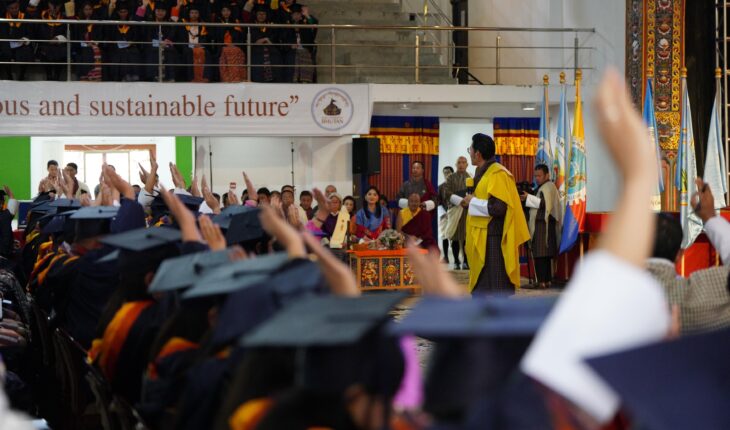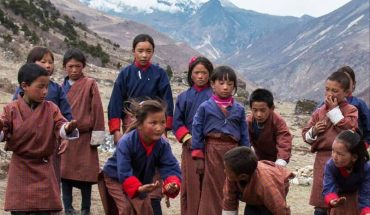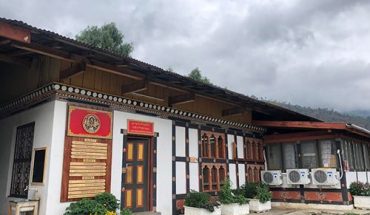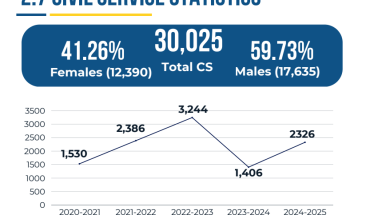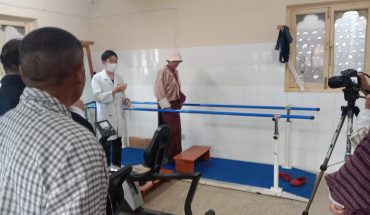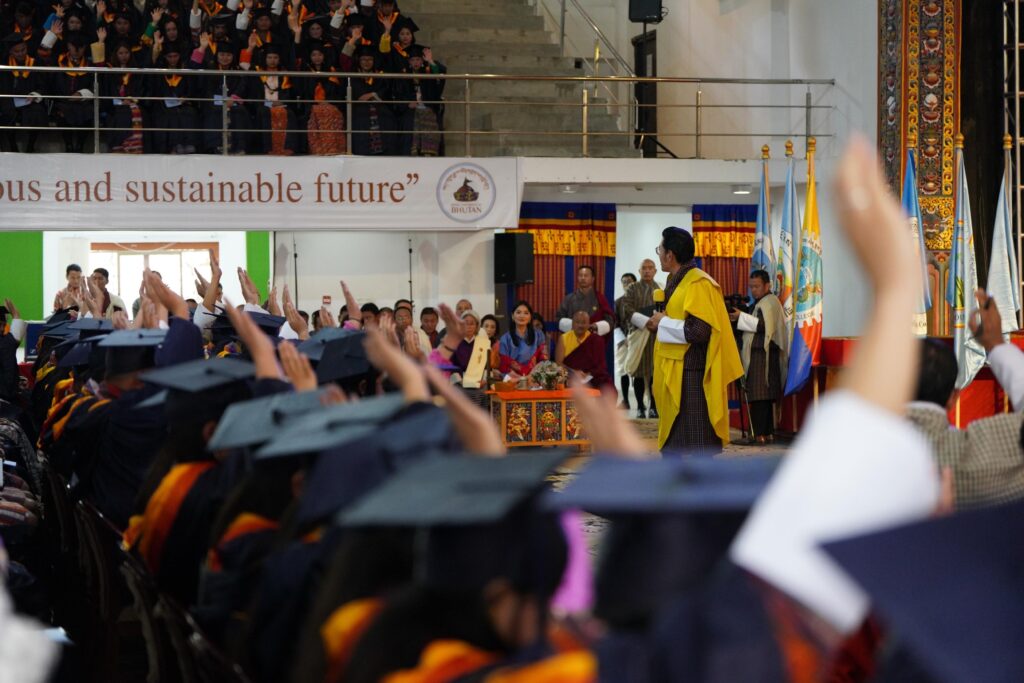
KINZANG DORJI TSHERING
Thimphu
His Majesty the King graced the 16th Convocation of the Royal University of Bhutan, where 1,931 graduates from eleven colleges under the university received their degrees and diplomas.
The ceremony, held at the Royal Institute of Management in Simtokha, was also attended by Her Majesty The Gyaltsuen, members of the University Council, ministers, and senior government officials.
The convocation marked not only a celebration of academic achievement but also a moment of deep reflection on the nation’s future as conveyed in His Majesty’s Royal Address.
During His Majesty’s address, he stated that Bhutan stands at a defining moment, experiencing a time of profound change and extraordinary promise.
His Majesty emphasized that this period offers an unprecedented opportunity for Bhutanese to shape their future according to their highest aspirations.
His Majesty underscored that the country’s greatest strength lies in its people—particularly the youth—who hold the potential to lead Bhutan into a new era of growth and development.
“We are living in a time of profound change and extraordinary promise—an unprecedented opportunity to shape the future in line with our highest aspirations,” His Majesty said.
Further, He also stressed the importance of leveraging Bhutan’s strong cultural foundations alongside emerging global technologies to enable transformative national initiatives.
Central to this national vision is the Gelephu Mindfulness City project, which His Majesty cited as a bold example of Bhutan’s capacity to balance tradition with innovation.
Underscoring the importance of knowledge, His Majesty highlighted that a well-read and informed citizenry is vital for the nation’s progress.
“A well-read citizenry, rich with knowledge and wisdom, holds immense potential,” His Majesty affirmed, urging graduates to cultivate wisdom, competence, and continuous learning in order to navigate the complexities of an evolving world.
In a unique and forward-thinking approach, His Majesty also engaged in a conversation with an artificial Intelligence assistant during his address. This dialogue, focused on the objectives and progress of the Gelephu Mindfulness City, illustrated Bhutan’s commitment to understanding and adopting emerging technologies in ways that support national priorities.
His Majesty emphasized that Artificial Intelligence, now increasingly influential across the world, offers tremendous potential for nations that approach it thoughtfully and strategically.
Among the graduates present, many reflected on the significance of His Majesty’s address through their own personal academic journeys.
Chogyal Tenzin, a Life Sciences graduate from Sherubtse College in Kanglung shared the challenges he faced in transitioning from theoretical learning to practical application, especially in subjects such as biochemistry and microbiology.
“During my academic journey, one of the main challenges I faced was transitioning from theoretical learning to practical application,” he said.
He addressed these challenges by actively participating in laboratory work and field projects, which helped shim, bridge the gap between academic knowledge and real-world practice.
“These experiences not only deepened my understanding but also boosted my confidence,” Chogyal added.
Like many students, Chogyal also had to balance academic demands with family responsibilities, a task that required strong organizational skills.
He said managing time between studies and family responsibilities was another hurdle. “I learned to prioritize and stay organized, which helped me stay on track without compromising either side.”
Reflecting on the most rewarding aspect of his education, Chogyal pointed to the opportunity to engage directly with local communities through practical projects focused on health awareness and environmental conservation.
“Seeing how my efforts could make a positive impact on others gave me a sense of purpose and reaffirmed my commitment to social and national development,” he shared.
Similarly, fellow graduate Tshering Yangchen from Norbu Rigter College in Paro reflected on the broader experiences many students face during their academic journeys. She noted that students often struggle with academic pressure, time management, financial challenges, and personal setbacks.
“Many overcome these by developing strong study habits, seeking support from mentors and peers, and maintaining resilience,” she said. Tshering emphasized that structured schedules, active learning techniques, and mindfulness practices have proven effective in helping students manage stress and stay focused.
When discussing the most rewarding part of education, Tshering highlighted how learning opens doors to new perspectives, opportunities, and personal growth.
For many, she explained, the greatest fulfillment comes from gaining knowledge that allows them to contribute meaningfully to society.
Others, she said, find value in developing critical thinking skills, forming lifelong friendships, and discovering their true passions through the educational process.
Chogyal added that today’s youth are more flexible, technologically adept, and socially conscious. “Unlike previous generations that often sought stable, long-term government jobs, many of us are open to diverse career paths, including entrepreneurship, NGOs, and digital professions,” he said.
Tshering echoed this sentiment, adding, “Today’s generation often values flexibility, innovation, and purpose in their careers more than previous ones. The rise of technology has created new job opportunities, remote work options, and an emphasis on entrepreneurship.”
In terms of national service, both of them emphasized that their generation embraces a broader and more dynamic approach.
The ceremony not only celebrated the academic accomplishments of the graduating class but also reaffirmed Bhutan’s dedication to fostering a generation of educated, capable, and socially responsible citizens who are ready to guide the nation into the future.

